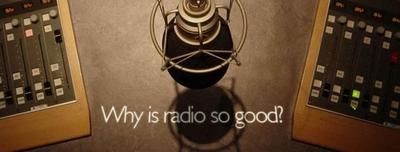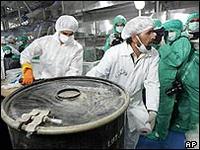
As I start back in schools radio this coming week I've been wondering why radio is so good. In today's age of multi-channel TV and lightning fast internet in the home, you'd be forgiven for thinking that radio is no longer required, but don't tune out just yet!
Someone once said that the pictures are much better on the radio and I suppose this is one of the main reasons why I love listening to it and working in it. Apart from making the audience think about what they can 'see' its also incredibly personal. The world of TV with all its lights and makeup is a million miles away from that personal voice which quietly speaks into your ear or keeps you company in the car.
 I've worked in radio for three years now and where some seem desperate to climb from radio to TV, I've fallen in love with producing for radio. It's not an easy job, the hours can be bad and sometimes things seem destined to go wrong but what an amazing thing it is to be able to bypass the bright lights of everyday life and speak straight into the soul. Carefully crafted words and content connect with the audience who aren't distracted by what's visible. People listen to the voices and hear emotion. They hear the anger of victims of crime or hatred and they hear the enthusiasm tinged with nervousness of the new author promoting their novel. We can laugh with the reporters who are interviewing children in the classroom or we can cry with someone blighted by terrorism.
I've worked in radio for three years now and where some seem desperate to climb from radio to TV, I've fallen in love with producing for radio. It's not an easy job, the hours can be bad and sometimes things seem destined to go wrong but what an amazing thing it is to be able to bypass the bright lights of everyday life and speak straight into the soul. Carefully crafted words and content connect with the audience who aren't distracted by what's visible. People listen to the voices and hear emotion. They hear the anger of victims of crime or hatred and they hear the enthusiasm tinged with nervousness of the new author promoting their novel. We can laugh with the reporters who are interviewing children in the classroom or we can cry with someone blighted by terrorism.
It was the latter as I heard one such interview which formed part of one of our recent programmes. I include an mp3 of it as part of my blog although if requested, I will have to remove it for copyright reasons.
Listen to this personal story of Lord Tebbit as it was broadcast on BBC GMR.
'LISTEN HERE'
After those powerful words from Lord Tebbit, I have nothing more to add to this post.
Monday, August 29, 2005
Sunday, August 28, 2005
The IT man cometh...
As I write this to you, I do so one computer down.
My beloved Toshiba Satellite 4xxx is, alas! No more.
After a brief period of reprise, the intermittent power fault returned and I was unable to fix it no matter how much I 'waddled' the connection in the socket. After careful consideration, and as a fully trained (ex)Toshiba authorized technician, I therefore took the bold decision of taking it to bits for a 'look'
If you've ever wondered why laptop computers are so expensive, its because they are quite complex on the inside, and despite my vast knowledge of Toshiba products, I was unable to fix the problem even after forcing the outside casing into a position which held the power hole secure. In the end, I decided to perform a very technical procedure to 'encourage' the circuit to re-connect without the use of a soldering iron however as the following video highlights, my attempt was unfortunately unsuccessful.
'encouragement video'
It is with great sadness that I bade a fond farewell to my Toshiba 'grey lady'. She served me well (sob!)
by
Paul Hurst
at
12:42 am
0
comments
![]()
Wednesday, August 10, 2005
 Are the BBC biased?
Are the BBC biased?
Within the last few days, I have heard many accusations made against the BBC of bias. Some claim that the BBC is intentionally choosing to misinform, mislead or under-represent certain groups within our society. Others accuse the corporation of political bias, interestingly each party on occasion claims this, so what can we categorically say on this issue? I thought I'd share my thoughts in this post.
Firstly, let me say that I think that 99% of these claims are without merit and are often made carelessly, with very little understanding of what bias actually is, so this is where I will begin.
When a shocking crime occurs and is reported, the BBC may report it as shocking or disturbing. How else could anyone describe the murder of children or rape of the elderly or infirmed? no one would call the BBC biased when reporters describe these crimes as shocking, however if a reporter claims that the death of a Palestinian civilian at the hands of an Israeli solder is shocking then the BBC can expect to receive complaints from some who are 'pro-Israel'. Why is this?
Its fair to say that it is practically impossible to report many stories from a completely neutral perspective. How can any journalist write or broadcast a story without including the human element? Should they even try? In fact, if we take out the human element, there is often no story left. Anyone who wants to tackle the issue of bias must dig much deeper than mere terminology.
Consistent reporting of error despite correction or constant portrayal of one point of view without affording a right to reply to those of a different persuasion, these things could be correctly identified as bias. So is the BBC biased?
Well I''ve worked with the BBC now for over three years and I'm yet to encounter bias in any great (or intentional) detail. Yes, the corporation has made mistakes but to claim, as many groups do, that the BBC is 'institutionally biased' is simply not true.
As a Christian who chooses to worship within more evangelical circles, its amazing how many times I hear the BBC, bad mouthed from public pulpits and speakers. It seems as though certain Christians are not prepared for any other voice to be heard apart from theirs. As the BBC holds the principal concept of 'free speech' at its core, perhaps its no wonder that fundamentalists see the BBC as morally defunct.
I think that anyone who wants to understand the BBC's position on bias only needs to consider how news teams reported the recent Hutton/WMD/sexed up story. Here, the news reporters themselves became the story. Yet the BBC still reported accurately and fairly regarding both themselves and their colleagues even though the corporation appeared weak in how it had dealt with this issue.
The result of the Hutton report was that all programme making staff were obliged to attend training sessions on editorial issues. Hardly the actions of a corporation which cares little about accuracy or bias? No the BBC continues to demand the highest levels of integrity and impartiality from its staff, even if this inevitably fails in isolated instances.
So why can't the BBC's critics learn from the corporations own example? Rather than throwing cheap words around to people with 'itchy ears', why not raise their issues through the BBC itself? Christians claim to be under-represented in the media yet they are the only people who can do something about it. Do they think that the BBC will approach them for their outreach related news or community based faith events? The BBC doesn't have an agenda against Christianity or Churches. It just doesn't hear from them very often.
I know the issue runs much deeper than this post. I haven't even mentioned 'balance'. Balance allows people with 'polarized views' to have their say by 'balancing' that point of view at a later time, or in a later programme. This area is much more complicated especially for my little blog.
Anyway, I hope that my post is of use to anyone who cares about these issues although I suspect some may think that I am biased in favour of the BBC :-)
by
Paul Hurst
at
10:10 pm
0
comments
![]()
Crisis talks over Iran's Nuclear programme CONCERNS ARE GROWING OVER IRAN'S ANNOUNCEMENT THAT THEY HAVE RESUMED URANIUM ENRICHMENT AT THE NUCLEAR PLANT IN ISFAHAN.
CONCERNS ARE GROWING OVER IRAN'S ANNOUNCEMENT THAT THEY HAVE RESUMED URANIUM ENRICHMENT AT THE NUCLEAR PLANT IN ISFAHAN.
Iran's nuclear programme had been under a self-imposed suspension since last year, however after the latest round of diplomatic talks yielded little result, the Iranian authorities have confirmed that their nuclear research has restarted.
The International Atomic Energy Agency (IAEA) are said to be holding crisis talks with Iranian officials and countries including Russia are trying to dissuade Iran from further nuclear development. The US president, George Bush has said he was "deeply suspicious" that Iran is trying to develop nuclear weapons.
The Iranian's claim to be working solely on Nuclear energy programmes, however many of the technologies needed are common for both energy provision and weaponry, the basic difference being that one is a controlled release of energy while the other is not. The process of energy development also encourages Uranium enrichment which greatly increases the amount of nuclear energy extractable from the already potent Uranium element.
Many commentators are worried that if Iran develops a nuclear arsenal, the whole stability of the middle east could be under immense threat. Israel already has nuclear weapons but whereas other countries use these WMD as deterrents, there are concerns that the non-democratic state of Iran may use, or sanction the use of nuclear weapons as acts of war or acts of terrorism. These are very worrying times in which we live and almost 60 years to the day since the less-powerful atom bombs were dropped on Japan, the threat of nuclear destruction still overshadows the world. The shadows are real, even if the weapons are not yet there to cast them. In a similar way, there remain shadows in Hiroshima from people who at 8.14am were there, but at 8.15 had gone. The only clue to their existence being a shape, permanently cast by the bombs incredible heat, heat which if felt in Israel after an Iranian attack, would literally lead to Armageddon.
These are very worrying times in which we live and almost 60 years to the day since the less-powerful atom bombs were dropped on Japan, the threat of nuclear destruction still overshadows the world. The shadows are real, even if the weapons are not yet there to cast them. In a similar way, there remain shadows in Hiroshima from people who at 8.14am were there, but at 8.15 had gone. The only clue to their existence being a shape, permanently cast by the bombs incredible heat, heat which if felt in Israel after an Iranian attack, would literally lead to Armageddon.
by
Paul Hurst
at
1:10 am
0
comments
![]()







